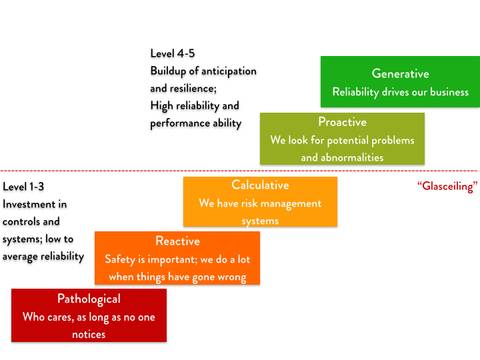In Germany alone, companies and agencies experience between 220 to 260 critical situations annually through internal as well as external events. These are characterized by acute danger for people, animals, the environment, or the assets and reputation of the company as a whole (see / cf. Rodenlieb/Dreher 2008).
In addition to this high frequency of critical situations, the global economic damage caused by unforeseen events is immense. In 2011, it is estimated at 123.9 billion U.S. dollars (see / cf Ernst & Young 2011). The numbers are increasing annually. Even a seemingly minor crisis can lead to a corporate crisis when it is made public and spread globally within minutes due to the new forms of communication.
Resilient organizations can work under very challenging conditions and still have far fewer accidents and incidents than would be statistically expected. The concept of High Reliability Organizing (HRO) helps companies and teams to better cope with unexpected events.
Resilient organizations go beyond established procedures of quality, risk and emergency management by practicing methods of high reliability organizing (HRO). To anticipate, prevent and manage crises interventions, a purely technology-based approach does not suffice. This is demonstrated by the learned experiences of organizations with high-risk potential, who on a daily basis cope with unexpected situations under extreme conditions, such as emergency medical teams, fire departments, nuclear power plants, crews of aircraft carriers and many more.
These organizations show a significant improvement in their error rates only when the concept of Resilient Organization and “shared mindfulness” is reached (cf. Weick / Suttcliffe 2010).
Expecting the unexpected
Resilient organizations perceive their environment as a complex, ever-changing system. This system consists of unexpected and unwanted effects and interference from outside and inside forces, which must be balanced by individual and situational measures. Throughout the organization as a whole a higher level of mindfulness is developed.
Through adapting flexible procedures pertaining to the circumstances, it is possible to achieve stability and reliability in spite of unforeseeable and unavoidable events.
Furthermore, resilient organizations are distinguished from conventional companies by their altered handling of the explicit and implicit expectations of their employees, customers and suppliers. Expectations influence our focus and efforts, thereby steering our decision making.
Executives search for events and findings that confirm their beliefs and expectations. This can lead to apparent indications of mistakes or shortcomings being overlooked. Through a conditioned orientation on what decision-makers want to see, so-called “blind spots” arise in their perception. Opposing views and results which are of the disconcerting nature are consequently ignored or go unrecognized.
Executives of Resilient organizations however, assume that their perceptions are generally incomplete. They see security and reliability as complex results for which continuous efforts and attention are needed. Constant reports and the mutual exchange of ideas are used as benchmarks for examining their expectations compared with the actual progress.
Decision making
Services
Firstly, we support you in the development of the essential foundations of a reliable organization (from level 1 to 3). Depending on the situation, we support you in the following:
- The conception of comprehensive security concepts
- Conduct risk assessment
- Establish emergency management systems
- Establish, develop and implement sustainable processes and standards to secure Business operations
- Control and coordinate the implementation of the Business Continuity
- Management lifecycle
- Consultation and training for the implementation of the business continuity management systems
- Development and implementation of awareness and prevention measures

Stages of resilience development
For the induction of High Reliability Organizing (Level 4-5) we apply methods from the five HRO-success factors
- HRO introductory workshop for a deeper understanding of HRO Success Factors
- Planning and moderation of workshops for in-depth analysis of individual unanticipated events and near misses. The level of mindfulness is to be improved sustainably.
- HRO culture assessments enable you to detect the blind spots of your organization in dealing with unexpected events, and to identify starting points for further development.
In our workshops we design with you a process of self-assessments, interviews, action workshops and group discussions to actively improve the level of High Reliability Organizing. This in turn serves to strengthen a culture of mindfulness within the company.
